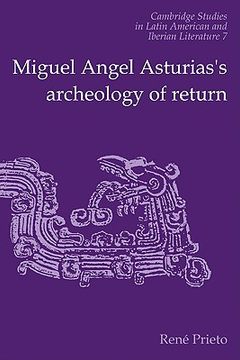Compartir
Miguel Angel Asturias's Archeology of Return (Cambridge Studies in Latin American and Iberian Literature) (en Inglés)
Reni Prieto
(Autor)
·
Cambridge University Press
· Tapa Blanda
Miguel Angel Asturias's Archeology of Return (Cambridge Studies in Latin American and Iberian Literature) (en Inglés) - Prieto, Reni
$ 37.57
$ 41.99
Ahorras: $ 4.42
Elige la lista en la que quieres agregar tu producto o crea una nueva lista
✓ Producto agregado correctamente a la lista de deseos.
Ir a Mis ListasSe enviará desde nuestra bodega entre el
Viernes 17 de Mayo y el
Lunes 20 de Mayo.
Lo recibirás en cualquier lugar de Estados Unidos entre 1 y 3 días hábiles luego del envío.
Reseña del libro "Miguel Angel Asturias's Archeology of Return (Cambridge Studies in Latin American and Iberian Literature) (en Inglés)"
Miguel Angel Asturias (1899-1974) is one of the notable literary figures in Latin America who in the 1920s contrived both to explore and define Latin literature within the mainstream of Western history. He managed to be poetic, political and mythological at the same time, and with a degree of synthesis rarely achieved then or since. As is the case with many Latin American writers, his work is inextricably linked with politics, and he lived in exile for many years. He was influenced by Indian mythology, fantasy and Surrealism and was the first Latin American novelist to understand the implications of anthropology and structural linguistics for culture and for fiction. In 1967, Asturias became the first Latin American novelist to win the Nobel Prize. René Prieto examines how Miguel Angel Asturias turns to the cultural traditions of the ancient Maya and combines them with the rhetoric of surrealism in order to produce three highly complex and widely misunderstood masterpieces; the Leyendas de Guatemala (1930), Hombres de maíz (1949) and Mulata de tal (1963). Asturias is the first American author to succeed in portraying an indigenous world vision that is blatantly non-Western. Borrowing a variety of techniques from preColumbian manuscripts, he creates a new type of literature that is still the best example of the cultural blend typifying the Americas. This is the first book to examine these three novels for their originality beyond the usual political readings normally attributed to them.
- 0% (0)
- 0% (0)
- 0% (0)
- 0% (0)
- 0% (0)
Todos los libros de nuestro catálogo son Originales.
El libro está escrito en Inglés.
La encuadernación de esta edición es Tapa Blanda.
✓ Producto agregado correctamente al carro, Ir a Pagar.

